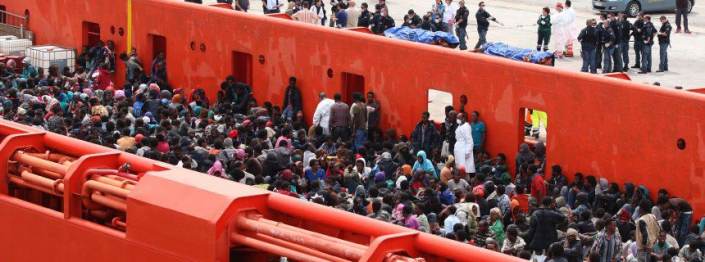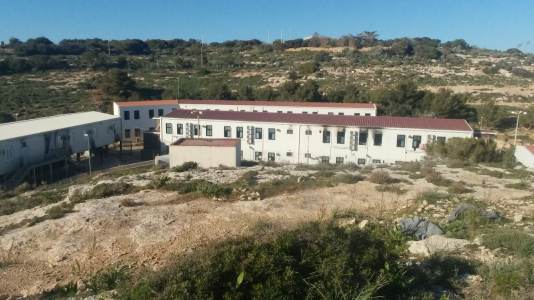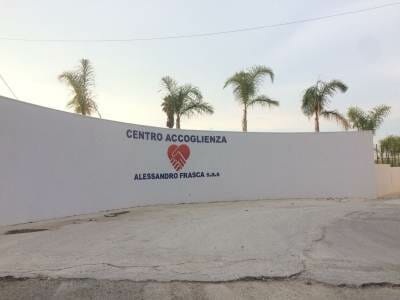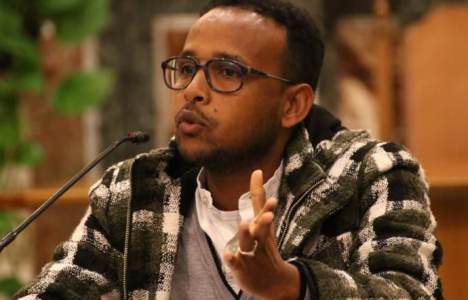We Are On the Edge of the Abyss
“The telephone rings and I wake up immediately. Someone is sobbing without pause on the other end of the line, and there are voices I can’t make out, I can only here vague voices asking for help, there’s another moment and then silence. I try and call the number back, but there’s nothing, it can’t be reached.” This is the desperate account of the mother of a young Tunisian man who is probably dead, to the total indifference of a society that has reached the peak of inhumanity.
 We are by now so accustomed to this horro that we are no longer aware that we have, in all likelihood, gone beyond the limit, and now stand on the edge of the abyss, in a road of no-return covered with so many gruesome events that they no longer manage to infuriate anyone any more. A Nigerian woman is killed at the French border and all you hear is “but she shouldn’t have come here”, “fortunately the French know how to deal with an invasion”, and even “one less.” We could report thousands of such comments, all more or less unrepeatable due to the violence they communicate. Across Europe, political forces are making electoral campaigns and even winning elections through instruemtnalising this violence and racism, without respone.
We are by now so accustomed to this horro that we are no longer aware that we have, in all likelihood, gone beyond the limit, and now stand on the edge of the abyss, in a road of no-return covered with so many gruesome events that they no longer manage to infuriate anyone any more. A Nigerian woman is killed at the French border and all you hear is “but she shouldn’t have come here”, “fortunately the French know how to deal with an invasion”, and even “one less.” We could report thousands of such comments, all more or less unrepeatable due to the violence they communicate. Across Europe, political forces are making electoral campaigns and even winning elections through instruemtnalising this violence and racism, without respone.
The political class in Italy is dominated by racist figures, whether those who ought be definitively sentenced for Mafia connections, or those who write deals with countries such as Libya, thus quite consciously participating in the massacre of migrants within detention centres, official or otherwise.
For its own part, the European Union also continues to finance Erdogan to block refugees, on the threat that he might open the gates if Europe were to stop bombing those who oppose his regime.
The political world now has its hands covered in blood, and the UN now lacks any credibility inasmuch as it relies on authorities that are investing vast economic resources in containing the migrant flows, financing dictators and regimes.
At sea we are witnessing operations by the Libyan Coast Guard coordinated directly by an Italian navy mission based in Tripoli, acting in order to intercept and bring back migrants leaving the Libyan coast. Many such migrants, in order to not be returned to the Libyan inferno, throw themselves into the sea. The NGOs are the only witnesses of these refoulements – de facto executed by Italy – and this is the reason why they need to be removed from the sea rescue operations, in any way possible.
And those who manage to cross the sea and arrive on our coasts?
Despite the fall in the number of arrivals, the hosting system is also on the brink.
The Hotspots at Lampedusa and Milo are functioning as deportation centres, with only Tunisians passing through them. How is it possible that, despite all the radars, the satellite systems, ect, that the small Tunisian vessels still manage to pass by, unobserved? Perhaps because there is an agreement with the Tunisian government, making deportations all too easy while simultaneously growing the business of the detention and rimpatriation?
Despite the press having been told that it was closed, the Lampedusa Hotspot continues to be used for Tunisianswho are then transfered by boat to Porto Empedocle, then Milo or are taken direcly to Palermo by plane, to then be flown to Tunisia on another aircraft. One can see the coaches every Monday and Thursday that punctually arrive from Trapani at the Falcone-Borsellino Airport, bringing the Tunisians who are being sent back.
On the other hand, there are those who have spent years in an Extraordinary Reception Centre*, only to be shown the door through decrees of “revoking hosting measures”, used to make space and remove those who are anything other than accomodating. The consequences are simply that there are vast numbers of people left in the street, forced to beg for a place to sleep and a crust of bread. Informal housing options, such as the Missione di Speranza e Carità in Palermo are on the point of collapse. The number of invisible people is growing, the number of people who are exploited is growing, the informal encampments, tent-cities and occupied houses in the Sicilian countryside are growing.
These are cyclic situations that have been repeating themselves for years, following a well-defined route laid down by the political class in order to create the conditions to keep the immigration business vibrant and always have the perfect scapegoat ready to hand: the dangerous migrant, the terrorist and the invader. Without a significant change of direction, it will be too late, and we will have already fallen into the brink.
Alberto Biondo
Borderline Sicilia
*Extraordinary Reception Centre = CAS
Project “OpenEurope” – Oxfam Italia, Diaconia Valdese, Borderline Sicilia Onlus
Translation by Richard Braude






